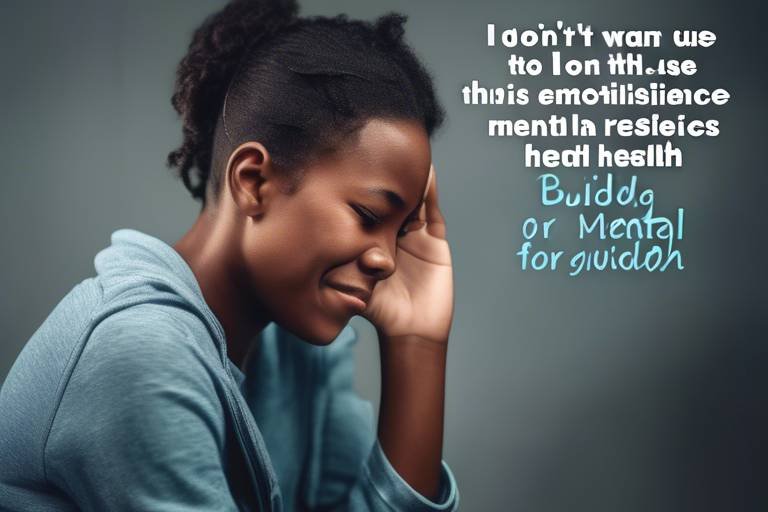Boosting Resilience - Dealing with Unexpected Life Changes
Life is a rollercoaster, isn't it? One moment, you're cruising along, and the next, you're thrown for a loop by unexpected changes. This article explores strategies for enhancing resilience in the face of life's unpredictable challenges, offering practical tips and insights to help individuals navigate change and emerge stronger. But what exactly is resilience, and why is it so important? Let's dive in!
Resilience is more than just a buzzword; it's the ability to bounce back from adversity. Think of it as your emotional trampoline, allowing you to spring back after life's inevitable falls. In a world where change is the only constant, cultivating resilience is crucial for maintaining our mental health and well-being. It empowers us to face challenges head-on and adapt to new circumstances with grace and strength. So how can we cultivate this essential trait in our everyday lives? Let’s break it down.
Unexpected life changes can feel like being hit by a freight train. Whether it’s a sudden job loss, a breakup, or even a move to a new city, these changes can be overwhelming. They often trigger a cascade of emotions, from anxiety to uncertainty, making it clear that we need to build resilience to manage these transitions effectively. Understanding the impact of these changes is the first step in learning how to cope.
Life changes can be categorized into various types, each with its own emotional toll. Here are some common types:
- Job-related changes: Losing a job or getting a promotion can shift your entire routine and sense of identity.
- Relationship shifts: Whether it’s a breakup or a new partnership, changes in personal relationships can lead to significant emotional upheaval.
- Health changes: A sudden illness or injury can drastically alter your lifestyle and outlook on life.
Each of these changes can affect our emotional well-being and mental health, making it essential to understand how they impact us.
Not all life changes are negative. In fact, some changes, like starting a new job or moving to a new city, can be incredibly exciting! However, even positive changes can lead to stress. It’s like getting a new puppy; while it’s a joyful experience, it also comes with a lot of responsibility and adjustment. Therefore, adapting to both positive and negative transitions is key to building resilience.
Understanding the difference between long-term and short-term changes is crucial for our resilience. Short-term changes, like a temporary project at work, might cause stress but are often easier to manage. In contrast, long-term changes, such as a career shift or a major life event, can require more profound adjustments. Recognizing the type of change you’re facing can help you tailor your coping strategies effectively.
Unexpected changes often lead to a whirlwind of psychological effects, including anxiety and uncertainty. It’s perfectly normal to feel overwhelmed when faced with significant life alterations. The emotional responses can vary widely, but they often include:
- Shock and disbelief
- Fear of the unknown
- Sadness or grief for what was lost
Recognizing these feelings is the first step in managing them. It’s essential to give yourself permission to feel these emotions while also seeking ways to cope and move forward.
Developing resilience is not a one-time event; it’s a proactive process that requires consistent effort. Here are some actionable strategies and techniques to help strengthen your resilience:
Mindfulness can be an incredible tool for enhancing resilience. By staying present and grounded during turbulent times, you can foster emotional stability and clarity. Techniques like meditation, deep breathing, and even yoga can help you center yourself when life gets chaotic. Think of mindfulness as your mental anchor, keeping you steady in stormy seas.
Lastly, having a strong support network is vital for resilience. Friends, family, and community members can provide emotional support during challenging life changes. Surrounding yourself with positive influences can make all the difference when navigating through tough times. Remember, it’s okay to lean on others; we’re all in this together!
Q: What is resilience?
A: Resilience is the ability to bounce back from adversity and adapt to change. It’s like having an emotional toolkit to help you navigate life’s challenges.
Q: How can I build resilience?
A: You can build resilience by practicing mindfulness, maintaining a strong support system, and developing coping strategies for dealing with stress.
Q: Are all life changes negative?
A: No, not all life changes are negative. Positive changes can also lead to stress, so it’s important to adapt to both types of transitions.

Understanding Resilience
Resilience is more than just a buzzword; it's a vital life skill that allows individuals to navigate the rocky roads of life with grace and strength. Imagine resilience as a rubber band; it stretches and bends but ultimately returns to its original shape. This ability to bounce back from adversity is crucial, especially when life throws unexpected challenges our way. Whether it's a sudden job loss, a relationship breakdown, or a health scare, resilience enables us to adapt and recover. But how do we cultivate this invaluable trait in our everyday lives?
The importance of resilience cannot be overstated. It serves as a buffer against stress and emotional turmoil, helping us to maintain our mental well-being during tough times. Research shows that resilient individuals tend to have better coping strategies, which can lead to improved health outcomes and overall happiness. In fact, resilience is linked to a range of positive effects, including increased life satisfaction and lower levels of anxiety and depression.
So, how can we develop resilience? It starts with understanding that resilience is not an innate trait; it's a skill that can be learned and strengthened over time. Here are some practical ways to foster resilience:
- Embrace Change: Accept that change is a part of life. Instead of resisting it, try to see it as an opportunity for growth.
- Practice Self-Compassion: Be kind to yourself during tough times. Acknowledge your feelings and give yourself permission to feel vulnerable.
- Set Realistic Goals: Break down your challenges into manageable steps, and celebrate small victories along the way.
Moreover, resilience is not just about individual strength; it's also about community. Building connections with others can significantly enhance our ability to cope with life's hurdles. When we surround ourselves with supportive friends and family, we create a safety net that can help us bounce back quicker. Remember, it's okay to lean on others when you're facing challenges—after all, we are social beings who thrive on connection.
In conclusion, understanding resilience is the first step towards mastering it. By embracing change, practicing self-compassion, and fostering strong relationships, we can develop the resilience needed to navigate life's unpredictable journey. Now, let’s dive deeper into the impact of unexpected changes and how they can test our resilience.

The Impact of Unexpected Changes
Life is a rollercoaster, isn’t it? One moment, everything seems to be cruising along smoothly, and the next, bam! You’re faced with unexpected changes that can throw you off balance. These changes can be anything from a sudden job loss, an unexpected health issue, or even a major life event like moving to a new city or going through a divorce. The reality is, when life throws us a curveball, it can feel overwhelming and disorienting.
But why do these unexpected changes have such a profound impact on us? It often boils down to our natural instincts. Humans are creatures of habit. We thrive on routine and predictability. When that routine is disrupted, it can trigger a cascade of emotional responses. You might feel anxiety creeping in, or perhaps a sense of loss or confusion. It's important to recognize that these feelings are normal and part of the human experience. In fact, many people experience a range of emotions during times of change, including:
- Shock: The initial reaction to unexpected news can leave you feeling stunned.
- Denial: Some may find it hard to accept the new reality.
- Anger: Frustration may arise as you grapple with the situation.
- Sadness: Feelings of loss are common, especially if the change involves letting go of something significant.
- Acceptance: Eventually, many find a way to come to terms with the change, leading to personal growth.
Each of these emotional responses can take a toll on your mental health. Research suggests that prolonged exposure to stress from unexpected changes can lead to anxiety disorders or depression. The psychological effects can be compounded if the changes are significant or occur in quick succession. Therefore, it's crucial to develop strategies to cope with these transitions effectively.
Moreover, the impact of unexpected changes isn't just psychological; it can also affect our physical well-being. Stress can manifest in various ways, from headaches and fatigue to more serious health issues. It’s like being caught in a storm without an umbrella; the rain of stress can seep into every aspect of your life, making it difficult to focus on anything else. Recognizing this interconnectedness of mind and body is essential for fostering resilience.
In summary, unexpected changes can create a whirlwind of emotions and stress, impacting our mental and physical health. Understanding these effects is the first step towards building resilience. By acknowledging our feelings and developing coping strategies, we can not only survive these changes but thrive in the face of them. Remember, it’s not about avoiding change; it’s about learning to dance in the rain.
Q: What are some common unexpected life changes people face?
A: Common changes include job loss, divorce, relocation, health issues, and the death of a loved one. Each of these can have a significant emotional impact.
Q: How can I manage my emotions during unexpected changes?
A: It’s important to acknowledge your feelings. Consider talking to someone you trust, practicing mindfulness, or engaging in physical activity to help process your emotions.
Q: Can unexpected changes lead to positive outcomes?
A: Absolutely! While they can be challenging, unexpected changes often lead to personal growth, new opportunities, and a greater understanding of oneself.

Types of Life Changes
Life is a rollercoaster ride filled with unexpected twists and turns, and understanding the types of changes we face can significantly impact our resilience. These changes can be broadly categorized into various types, each bringing its own set of challenges and emotional responses. From job loss to the end of a relationship, the spectrum of life changes can leave us feeling vulnerable and uncertain. It’s essential to recognize these changes not just as hurdles but as opportunities for growth.
Some of the most common types of life changes include:
- Career Changes: This encompasses job loss, promotions, or even a complete career shift. Each of these can evoke feelings of anxiety or excitement.
- Relationship Changes: Whether it’s a breakup, divorce, or the start of a new relationship, changes in personal relationships can significantly affect our emotional landscape.
- Health Changes: A sudden illness or injury can drastically alter one’s life, often requiring adjustments in lifestyle and mindset.
- Financial Changes: Experiencing financial difficulties or sudden wealth can lead to stress and anxiety, impacting how we view security and stability.
- Relocation: Moving to a new city or country can be both exciting and daunting, as it often means starting over and adapting to new environments.
Each type of change can trigger a unique psychological response. For instance, losing a job may lead to feelings of inadequacy and fear about the future, while starting a new job might bring about excitement but also stress from the need to adapt quickly. The emotional toll these changes take on us is profound, and understanding the nuances can help us better prepare and respond.
Moreover, it’s important to recognize that life changes can be both positive and negative. A promotion at work, for example, is generally seen as a positive change, yet it can also bring about stress as one adjusts to new responsibilities. This duality emphasizes the need for resilience, as we navigate the complexities of our emotional reactions to both types of transitions.
Lastly, changes can be categorized based on their duration. Some are short-term, like a temporary job assignment, while others are long-term, such as relocating to a new city permanently. Understanding whether a change is likely to be fleeting or enduring can influence how we cope and adapt. Short-term changes might require immediate adjustments, while long-term changes may necessitate a more profound transformation in our daily routines and mindset.
In summary, recognizing the various types of life changes we encounter is crucial for building resilience. By understanding the emotional responses associated with these changes and their impacts on our lives, we can better equip ourselves to handle whatever life throws our way.

Positive vs. Negative Changes
When we think about life changes, it’s easy to categorize them as either positive or negative. But here’s the kicker: both types can stir up a whirlwind of emotions and challenges. For instance, landing your dream job can feel exhilarating, but it may also come with the stress of new responsibilities and the pressure to perform. On the flip side, losing a job is undoubtedly a negative change, yet it can also open doors to new opportunities that you never considered before. Isn’t it fascinating how a single event can cast such different shadows on our lives?
Let’s break it down a bit more. Positive changes often include milestones like getting married, having a baby, or even moving to a new city. While these events are generally celebrated, they can also provoke feelings of anxiety and uncertainty. The excitement of a wedding might be laced with stress about planning, finances, and family dynamics. Similarly, the joy of welcoming a child can quickly turn into sleepless nights and the overwhelming responsibility of parenthood.
On the other hand, negative changes like a breakup or the death of a loved one are undoubtedly painful. But they can also serve as pivotal moments for personal growth. They challenge us to reevaluate our priorities and often lead to deeper connections with those who support us through tough times. In essence, both positive and negative changes can act as catalysts for growth, pushing us to adapt and evolve.
To illustrate this, consider the following table that contrasts the impacts of positive and negative changes:
| Type of Change | Examples | Potential Emotional Effects |
|---|---|---|
| Positive Changes | Marriage, Promotion, Birth of a Child | Excitement, Anxiety, Overwhelm |
| Negative Changes | Job Loss, Divorce, Death | Sadness, Anger, Uncertainty |
So, how do we navigate these changes? Understanding that both positive and negative transitions can lead to stress is the first step. It’s crucial to recognize that your feelings are valid, regardless of whether the change is seen as good or bad. Embracing this duality allows us to approach life’s twists and turns with a sense of curiosity rather than fear. After all, life is a series of changes, and each one, whether joyous or sorrowful, shapes who we are and who we will become.

Long-term vs. Short-term Changes
When we talk about life changes, it's essential to recognize the difference between long-term and short-term changes, as each type influences our resilience and coping mechanisms in unique ways. Short-term changes are often sudden and can be disruptive, but they usually have a defined endpoint. For instance, a job loss or a breakup can feel like the end of the world, but these experiences often lead to new beginnings and opportunities for growth. On the other hand, long-term changes, such as chronic illness or a significant life transition like retirement, can be more complex and require a sustained effort to adapt.
Understanding the nature of these changes can empower us to respond more effectively. Short-term changes might trigger immediate emotional responses, such as shock or sadness. However, they often allow for a quicker recovery. In contrast, long-term changes can lead to prolonged periods of adjustment, which might include feelings of anxiety or uncertainty. This is why developing resilience is crucial; it equips us with the tools to navigate both types of changes with greater ease.
To illustrate the differences further, consider the following table:
| Type of Change | Duration | Impact on Resilience | Examples |
|---|---|---|---|
| Short-term | Days to Months | Quick recovery, immediate emotional response | Job loss, breakup, moving to a new city |
| Long-term | Months to Years | Prolonged adjustment, ongoing emotional management | Chronic illness, retirement, caregiving for a loved one |
It's also worth noting that our responses to these changes can overlap. A short-term change can lead to long-term effects, especially if it significantly alters our life trajectory. For example, losing a job may initially seem like a temporary setback, but if it leads to prolonged unemployment, the emotional toll can become more substantial over time. Hence, it’s vital to approach each change with an open mind and a willingness to adapt.
In conclusion, recognizing whether a change is short-term or long-term can help us tailor our coping strategies. By being aware of the potential emotional impacts and the necessary adjustments, we can bolster our resilience and navigate life's unpredictable waters with greater confidence.
- What is resilience? Resilience is the ability to recover from setbacks and adapt to change.
- How can I build resilience? Techniques such as mindfulness, establishing a support system, and maintaining a positive outlook can help build resilience.
- Are all life changes negative? No, both positive and negative changes can lead to stress and require adaptation.
- How do I cope with long-term changes? Focus on self-care, seek support, and develop strategies to manage stress effectively.

Psychological Effects of Change
Life is a rollercoaster, isn’t it? Just when you think you’ve got everything figured out, unexpected changes come crashing in like a surprise twist in your favorite movie. These changes can stir a whirlwind of emotions, often leaving us feeling anxious, confused, or even overwhelmed. Understanding the psychological effects of change is crucial for navigating these turbulent waters and emerging stronger on the other side.
When we encounter unexpected changes, our minds can react in various ways. Common emotional responses include:
- Anxiety: The uncertainty of change can trigger feelings of anxiety. It’s like standing at the edge of a cliff, unsure whether to jump or stay put.
- Sadness: Loss—whether it’s a job, relationship, or a familiar routine—can lead to feelings of grief and sadness.
- Fear: Fear of the unknown can paralyze us, making it hard to take the next step.
- Excitement: Surprisingly, change can also bring about feelings of excitement, especially if it opens doors to new opportunities.
These emotional responses are perfectly normal, but they can also be quite taxing on our mental health. It’s essential to acknowledge these feelings rather than suppress them. Ignoring your emotions is like trying to hold a beach ball underwater; eventually, it will pop back up, often with more force than before.
Moreover, the psychological effects of change can manifest physically. Stress can lead to headaches, fatigue, and a weakened immune system. It’s a reminder that our mental and physical health are deeply intertwined. When we’re feeling mentally drained, it often shows up in our bodies, making it even more important to address these changes head-on.
So, how do we manage these psychological effects? Here are a few strategies:
- Acceptance: Accept that change is a part of life. Embracing it can lessen the burden and help you move forward.
- Talk it out: Sharing your feelings with friends or family can provide relief. Sometimes, just voicing your thoughts can lighten the load.
- Seek professional help: If you find yourself struggling to cope, talking to a mental health professional can provide the guidance and support you need.
In conclusion, while change can be daunting, it’s also an opportunity for growth and transformation. By understanding the psychological effects and implementing coping strategies, we can build resilience and navigate life’s unpredictable nature with a bit more grace. Remember, it’s okay to feel a bit lost sometimes; what matters is how you choose to find your way back.
Q: What are some common psychological effects of unexpected life changes?
A: Common psychological effects include anxiety, sadness, fear, and sometimes excitement. Each person may respond differently based on their circumstances and coping mechanisms.
Q: How can I cope with the anxiety that comes from sudden changes?
A: Coping strategies include practicing mindfulness, talking to someone you trust, and accepting that change is a part of life. Seeking professional help can also be beneficial.
Q: Is it normal to feel overwhelmed by change?
A: Yes, it’s completely normal to feel overwhelmed. Change can disrupt our routines and create uncertainty, leading to various emotional responses.
Q: Can positive changes also lead to stress?
A: Absolutely! Even positive changes, like a new job or moving to a new city, can cause stress as they often come with new challenges and adjustments.

Building Personal Resilience
Building personal resilience is like constructing a sturdy house; it requires a solid foundation, quality materials, and regular maintenance. In the face of life's unpredictable challenges, strengthening your ability to bounce back is essential. So, how do we start this process? Well, it begins with understanding that resilience is not just an innate trait—it's a skill that can be developed over time. Just like you wouldn’t expect a plant to grow without water, your resilience needs nurturing and care.
One of the most effective ways to enhance resilience is through mindfulness practices. Mindfulness teaches us to live in the moment, which can be incredibly grounding during turbulent times. Techniques such as meditation, deep-breathing exercises, and yoga can help calm the mind, reduce stress, and foster emotional stability. Imagine standing in the eye of a storm—while chaos swirls around you, you remain calm and centered. That’s the power of mindfulness.
Moreover, having a strong support system is vital for resilience. Friends, family, and community members play a crucial role in providing emotional support during challenging times. Think of your support system as a safety net; when you fall, they’re there to catch you. Engaging with others can help you feel less isolated and more understood. It’s important to surround yourself with positive influences that encourage you to grow and adapt. After all, a sturdy net is made of strong fibers, and the same goes for your relationships.
To further bolster your resilience, consider implementing some practical strategies:
- Set realistic goals: Break down your challenges into manageable tasks to avoid feeling overwhelmed.
- Practice self-care: Prioritize activities that promote your physical, emotional, and mental well-being.
- Embrace change: View change as an opportunity for growth rather than a setback.
Another pivotal aspect of building resilience is fostering a positive mindset. This doesn't mean ignoring the negative; rather, it involves acknowledging your feelings and then choosing to focus on the positives. For instance, when faced with a setback, ask yourself, “What can I learn from this experience?” This shift in perspective can transform challenges into valuable lessons, much like turning a stumbling block into a stepping stone.
Finally, remember that building resilience is a continuous journey. Just as a tree needs time to grow strong roots, your resilience will develop with practice and patience. Celebrate your progress, no matter how small, and don’t hesitate to reach out for help when needed. Everyone faces challenges, but with the right tools and support, you can emerge stronger and more resilient than ever.
Q: What is resilience?
A: Resilience is the ability to bounce back from adversity, stress, or change, allowing individuals to adapt and recover from difficult situations.
Q: Can anyone develop resilience?
A: Yes! Resilience is a skill that can be cultivated through various practices, such as mindfulness, building a support network, and maintaining a positive mindset.
Q: How does mindfulness contribute to resilience?
A: Mindfulness helps individuals stay present and grounded, reducing stress and fostering emotional stability, which are crucial during challenging times.
Q: Why is a support system important for resilience?
A: A strong support system provides emotional backing, encouragement, and practical help during tough times, making it easier to navigate life's challenges.

Mindfulness Practices
When life throws unexpected changes our way, it's easy to feel like we're caught in a whirlwind, spinning out of control. That's where mindfulness comes in—it's like a life raft in the turbulent sea of emotions. Mindfulness is all about being present in the moment, fully engaging with our thoughts and feelings without judgment. It’s about recognizing the chaos around us and finding a way to navigate through it with clarity and calm.
One of the most effective mindfulness practices is meditation. Just a few minutes of focused breathing can ground you, allowing you to step back from your racing thoughts. Imagine sitting quietly, focusing on your breath, and feeling the tension melt away. It’s not just about relaxation; it's about training your mind to respond rather than react. This practice helps in building resilience by enabling you to approach challenges with a clear mind and a steady heart.
Another powerful tool in your mindfulness arsenal is body awareness. This involves tuning into your body’s sensations and understanding how stress manifests physically. For instance, do you notice tightness in your shoulders when you're anxious? Paying attention to these signals can help you address your emotional state before it spirals out of control. You might find it helpful to engage in practices such as yoga or tai chi, which combine movement with mindfulness, promoting both physical and emotional well-being.
To further enhance your mindfulness practice, consider incorporating gratitude journaling. Each day, take a moment to jot down a few things you are grateful for. This simple act shifts your focus from what’s going wrong to what’s going right, fostering a positive mindset even amidst chaos. You might be surprised at how such a small change can significantly impact your overall resilience.
Here’s a quick table summarizing some mindfulness practices you can try:
| Mindfulness Practice | Description |
|---|---|
| Meditation | Focusing on your breath to cultivate awareness and calm. |
| Body Awareness | Noticing physical sensations and stress signals in your body. |
| Gratitude Journaling | Writing down things you are thankful for to shift your perspective. |
| Mindful Walking | Walking slowly and paying attention to the sensations of movement. |
Finally, don't forget the power of mindful breathing. Whenever you feel overwhelmed, take a moment to pause and breathe deeply. Inhale for a count of four, hold for four, and exhale for four. This simple exercise can bring you back to the present and help you regain control over your emotions. Remember, practicing mindfulness isn't about perfection; it's about progress. The more you incorporate these practices into your daily routine, the more resilient you’ll become.
- What is mindfulness? Mindfulness is the practice of being fully present and engaged in the moment without judgment.
- How can mindfulness help with resilience? Mindfulness helps you manage stress and emotional responses, allowing you to approach challenges with a clearer mind.
- Do I need to meditate for long periods to benefit from mindfulness? No, even a few minutes of focused breathing or meditation can be beneficial.
- Can mindfulness practices be done anywhere? Absolutely! You can practice mindfulness during your daily activities, such as walking, eating, or even during work breaks.

Support Systems
When life throws unexpected challenges our way, it can feel like we're standing alone in a storm without an umbrella. This is where come into play, acting as our safety net. Having a strong network of friends, family, and community members can significantly enhance our ability to cope with change. These relationships provide not just emotional support, but also practical help and encouragement. Think of it as a lifeline—when you’re feeling overwhelmed, a simple chat with a friend can bring clarity and comfort.
Support systems can take many forms. They might include:
- Family Members: Often our first line of defense, family can offer unconditional love and understanding.
- Friends: Close friends can provide a listening ear and share experiences that make us feel less isolated.
- Community Groups: Whether it's a local club or an online forum, connecting with others who share similar experiences can be incredibly validating.
- Professional Help: Sometimes, talking to a therapist or counselor can help us navigate our feelings and develop coping strategies.
Moreover, the emotional and psychological benefits of having a support system are backed by research. Studies show that individuals with strong social connections tend to experience lower levels of stress and anxiety. They are more likely to maintain a positive outlook and have better overall mental health. In fact, a study from the University of Michigan revealed that people with supportive social networks were better equipped to handle life’s ups and downs. This highlights the importance of nurturing our relationships, especially during times of change.
It's essential to remember that building a support system takes time and effort. Here are some tips to strengthen your connections:
- Reach Out: Don’t hesitate to contact friends or family when you need support. A simple text or call can initiate a meaningful conversation.
- Be Present: Show up for others, too. Being there for a friend in need can deepen your bond and create a reciprocal support system.
- Join Groups: Look for local or online communities that align with your interests or experiences. Engaging with others can help you feel more connected.
In summary, the role of support systems in enhancing resilience cannot be understated. They are like the anchors that keep us grounded when the waves of life try to toss us around. So, the next time you face an unexpected change, remember that you don’t have to go through it alone. Lean on your support system; they’re there to help you weather the storm.
Q: How can I build a strong support system?
A: Start by reaching out to friends and family. Join community groups or clubs that interest you. Be proactive in nurturing these relationships by being present and supportive in return.
Q: What if I feel alone and don't have a support system?
A: It’s never too late to build connections. Consider joining local organizations, volunteering, or participating in online forums where you can meet new people who share your interests.
Q: How do support systems help with resilience?
A: Support systems provide emotional comfort, practical assistance, and encouragement, all of which can help reduce stress and enhance your ability to cope with life’s challenges.
Frequently Asked Questions
- What is resilience and why is it important?
Resilience is essentially your ability to bounce back from life's tough moments. Think of it as your emotional rubber band; the more resilient you are, the less likely you are to snap under pressure. It's important because life is full of unexpected changes, and having resilience helps you navigate those challenges with greater ease and strength.
- What types of unexpected life changes should I be aware of?
Life can throw all sorts of curveballs your way. Common unexpected changes include job loss, relationship breakups, health issues, or even moving to a new city. Each of these can stir up a whirlwind of emotions, making it essential to cultivate resilience to manage them effectively.
- Are positive changes stressful too?
Absolutely! It's a common misconception that only negative changes cause stress. Positive changes, like starting a new job or getting married, can also bring about anxiety and uncertainty. The key is to recognize that any change, positive or negative, requires adjustment and can be overwhelming at times.
- How can mindfulness practices help build resilience?
Mindfulness practices, such as meditation or deep breathing exercises, can help you stay grounded during turbulent times. By focusing on the present moment, you can reduce anxiety and gain clarity, making it easier to cope with life's challenges. Think of mindfulness as your mental anchor in a stormy sea.
- What role do support systems play in resilience?
Having a strong support system is like having your own personal cheerleading squad. Friends, family, and community can provide emotional support, encouragement, and practical help when you face challenges. It’s crucial to lean on these connections when the going gets tough.
- How can I start building my resilience today?
You can start by incorporating small, actionable strategies into your daily routine. This might include practicing mindfulness, reaching out to loved ones for support, or setting realistic goals to manage stress. Remember, building resilience is a journey, not a sprint!



















